初中英语语法知识—副词的单元汇编
副词的用法知识点总结
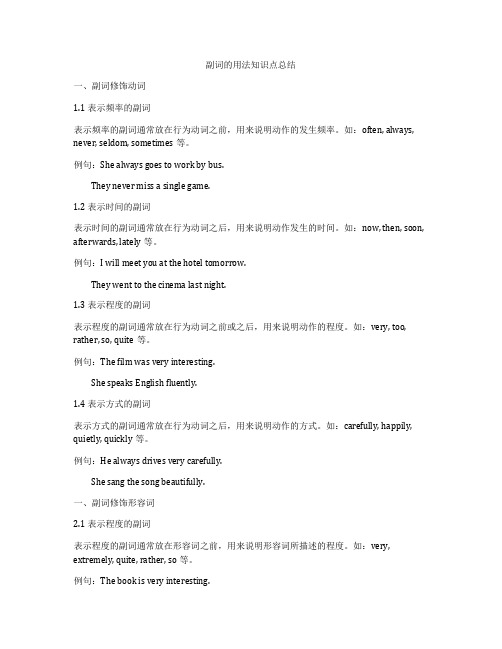
副词的用法知识点总结一、副词修饰动词1.1 表示频率的副词表示频率的副词通常放在行为动词之前,用来说明动作的发生频率。
如:often, always, never, seldom, sometimes等。
例句:She always goes to work by bus.They never miss a single game.1.2 表示时间的副词表示时间的副词通常放在行为动词之后,用来说明动作发生的时间。
如:now, then, soon, afterwards, lately等。
例句:I will meet you at the hotel tomorrow.They went to the cinema last night.1.3 表示程度的副词表示程度的副词通常放在行为动词之前或之后,用来说明动作的程度。
如:very, too, rather, so, quite等。
例句:The film was very interesting.She speaks English fluently.1.4 表示方式的副词表示方式的副词通常放在行为动词之后,用来说明动作的方式。
如:carefully, happily, quietly, quickly等。
例句:He always drives very carefully.She sang the song beautifully.一、副词修饰形容词2.1 表示程度的副词表示程度的副词通常放在形容词之前,用来说明形容词所描述的程度。
如:very, extremely, quite, rather, so等。
例句:The book is very interesting.She looks extremely tired.二、副词修饰副词3.1 表示程度的副词表示程度的副词通常放在另一个副词之前,用来说明副词的程度。
如:very, too, quite, so, rather等。
初中副词的种类与用法归纳
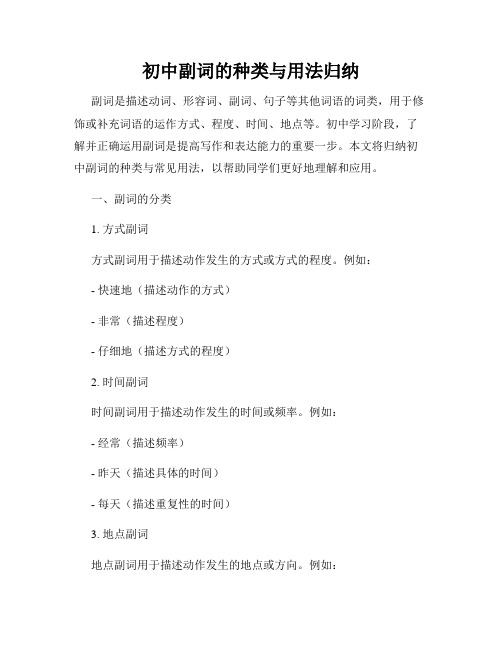
初中副词的种类与用法归纳副词是描述动词、形容词、副词、句子等其他词语的词类,用于修饰或补充词语的运作方式、程度、时间、地点等。
初中学习阶段,了解并正确运用副词是提高写作和表达能力的重要一步。
本文将归纳初中副词的种类与常见用法,以帮助同学们更好地理解和应用。
一、副词的分类1. 方式副词方式副词用于描述动作发生的方式或方式的程度。
例如:- 快速地(描述动作的方式)- 非常(描述程度)- 仔细地(描述方式的程度)2. 时间副词时间副词用于描述动作发生的时间或频率。
例如:- 经常(描述频率)- 昨天(描述具体的时间)- 每天(描述重复性的时间)3. 地点副词地点副词用于描述动作发生的地点或方向。
例如:- 在这里(描述具体的地点)- 向前(描述方向)- 远离(描述相对位置)4. 程度副词程度副词用于描述动词、形容词或副词的程度。
例如:- 很(描述程度)- 最(描述比较级)- 非常(描述非常级)5. 位置副词位置副词用于描述动作发生的位置或方向。
例如:- 上面(描述具体的位置)- 向下(描述方向)- 隔壁(描述相对位置)6. 频率副词频率副词用于描述动作或事件发生的次数。
例如:- 有时(描述偶尔)- 经常(描述频繁)- 从不(描述否定频率)二、副词的用法1. 修饰动词副词可以直接修饰动词,表示动词的方式、程度、时间等。
例如:- 他慢慢地走了过来。
- 她高兴地笑了起来。
- 我们昨天去了公园玩。
2. 修饰形容词副词可以修饰形容词,表示对形容词的程度或强调。
例如:- 这本书非常有趣。
- 这个问题太难了。
- 她非常漂亮。
3. 修饰副词副词可以修饰其他副词,用于强调程度或方式的不同。
例如:- 她非常认真地工作。
- 我们一起快乐地唱歌。
- 他们高兴地跳了起来。
4. 修饰句子副词可以修饰整个句子,表示说话人的态度、观点或者句子所描述的动作发生的情况。
例如:- 幸好,我们按时赶到了。
- 不幸的是,他们迟到了。
- 无论如何,我都会努力完成任务。
副词初中知识点归纳
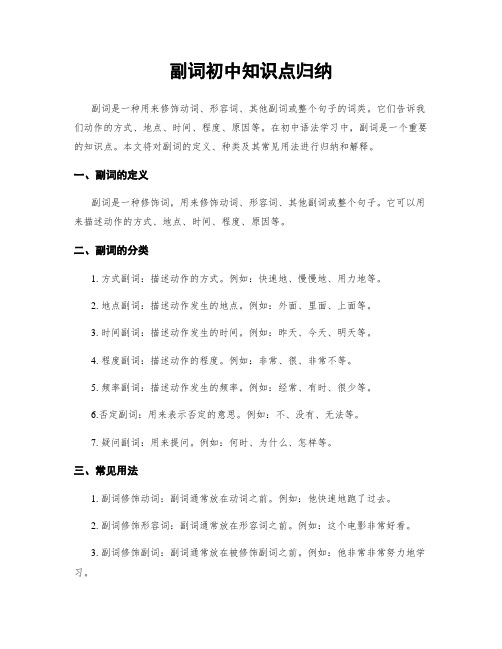
副词初中知识点归纳副词是一种用来修饰动词、形容词、其他副词或整个句子的词类。
它们告诉我们动作的方式、地点、时间、程度、原因等。
在初中语法学习中,副词是一个重要的知识点。
本文将对副词的定义、种类及其常见用法进行归纳和解释。
一、副词的定义副词是一种修饰词,用来修饰动词、形容词、其他副词或整个句子。
它可以用来描述动作的方式、地点、时间、程度、原因等。
二、副词的分类1. 方式副词:描述动作的方式。
例如:快速地、慢慢地、用力地等。
2. 地点副词:描述动作发生的地点。
例如:外面、里面、上面等。
3. 时间副词:描述动作发生的时间。
例如:昨天、今天、明天等。
4. 程度副词:描述动作的程度。
例如:非常、很、非常不等。
5. 频率副词:描述动作发生的频率。
例如:经常、有时、很少等。
6.否定副词:用来表示否定的意思。
例如:不、没有、无法等。
7. 疑问副词:用来提问。
例如:何时、为什么、怎样等。
三、常见用法1. 副词修饰动词:副词通常放在动词之前。
例如:他快速地跑了过去。
2. 副词修饰形容词:副词通常放在形容词之前。
例如:这个电影非常好看。
3. 副词修饰副词:副词通常放在被修饰副词之前。
例如:他非常非常努力地学习。
4. 副词修饰整个句子:副词通常放在句首或句末。
例如:幸运地,他赢得了比赛。
四、注意事项1. 副词的变化形式:有些副词有比较级和最高级。
例如:慢慢地→更慢地→最慢地。
2. 副词的位置灵活:副词可以在句子中灵活地移动,但要注意语序的准确性和文章的连贯性。
3. 副词的拼写规则:有些形容词在转化为副词时要改变拼写。
例如:good(形容词)→well(副词)。
五、例句说明1. 方式副词:他慢慢地和我们道别。
2. 地点副词:小狗躺在草地上。
3. 时间副词:明天我们要去博物馆参观。
4. 程度副词:他非常高兴地接受了邀请。
5. 频率副词:他经常在公园里散步。
6. 否定副词:我不喜欢吃辣的食物。
7. 疑问副词:你们为什么这么晚才到?六、总结副词是修饰词中的一个重要部分。
八年级下册英语副词语法知识点归纳总结
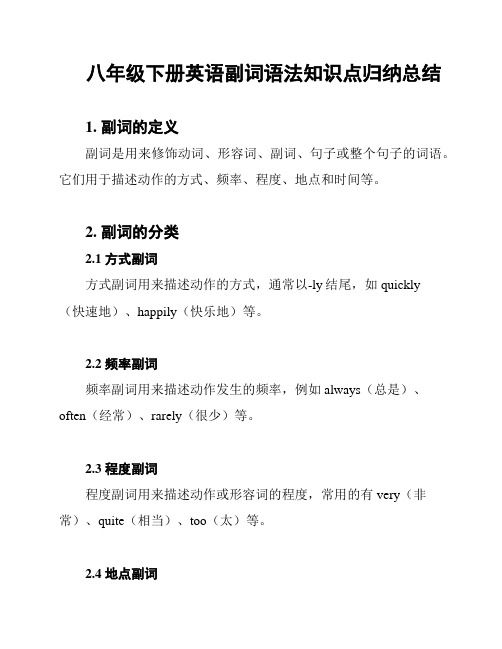
八年级下册英语副词语法知识点归纳总结1. 副词的定义副词是用来修饰动词、形容词、副词、句子或整个句子的词语。
它们用于描述动作的方式、频率、程度、地点和时间等。
2. 副词的分类2.1 方式副词方式副词用来描述动作的方式,通常以-ly结尾,如quickly(快速地)、happily(快乐地)等。
2.2 频率副词频率副词用来描述动作发生的频率,例如always(总是)、often(经常)、rarely(很少)等。
2.3 程度副词程度副词用来描述动作或形容词的程度,常用的有very(非常)、quite(相当)、too(太)等。
2.4 地点副词地点副词用来表示动作发生的地点,例如here(这里)、there (那里)、everywhere(到处)等。
2.5 时间副词时间副词用来表示动作发生的时间,如now(现在)、then (那时)、soon(很快)等。
3. 副词的用法3.1 修饰动词副词可用于修饰动词,描述动作的方式、频率或程度。
例如:- She speaks English fluently.(她说英语流利地。
)- They often go hiking on weekends.(他们经常在周末去徒步旅行。
)3.2 修饰形容词副词可以修饰形容词,表示程度或评价。
例如:- He is very tall.(他很高。
)- It's quite hot today.(今天很热。
)3.3 修饰副词副词也可以修饰其他副词,表示程度或频率的变化。
例如:- She runs very quickly.(她跑得非常快。
)- He rarely goes out at night.(他很少在晚上出去。
)3.4 修饰句子或整个句子副词还可以修饰整个句子或表达说话人的态度或观点。
例如:- Luckily, I found my keys.(幸运地,我找到了我的钥匙。
)- Frankly speaking, I don't agree with you.(坦率地说,我不同意你的观点。
初中英语语法专题—副词讲解
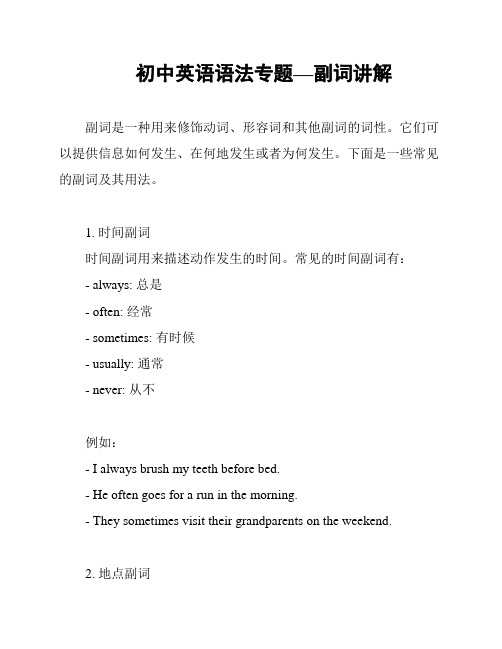
初中英语语法专题—副词讲解副词是一种用来修饰动词、形容词和其他副词的词性。
它们可以提供信息如何发生、在何地发生或者为何发生。
下面是一些常见的副词及其用法。
1. 时间副词时间副词用来描述动作发生的时间。
常见的时间副词有:- always: 总是- often: 经常- sometimes: 有时候- usually: 通常- never: 从不例如:- I always brush my teeth before bed.- He often goes for a run in the morning.- They sometimes visit their grandparents on the weekend.2. 地点副词地点副词用来描述动作发生的地点。
常见的地点副词有:- here: 这里- there: 那里- everywhere: 到处- nearby: 附近- far: 远离例如:- Put the book here.- I want to go there.- You can find flowers everywhere in the garden.3. 程度副词程度副词用来描述动作或形容词的程度。
常见的程度副词有:- very: 非常- extremely: 极其- quite: 相当- too: 太- slightly: 稍微例如:- The movie was very interesting.- She is extremely talented in singing.- The food is quite delicious.4. 方式副词方式副词用来描述动作发生的方式。
常见的方式副词有:- slowly: 慢慢地- quickly: 快速地- carefully: 小心地- loudly: 大声地- quietly: 静静地例如:- Walk slowly in the park.- She speaks quickly.- Drive carefully on the road.记住,副词可以帮助我们更生动地描述动作的具体细节,让我们的语言更加丰富多样。
初中英语语法专题-副词(附练习答案)
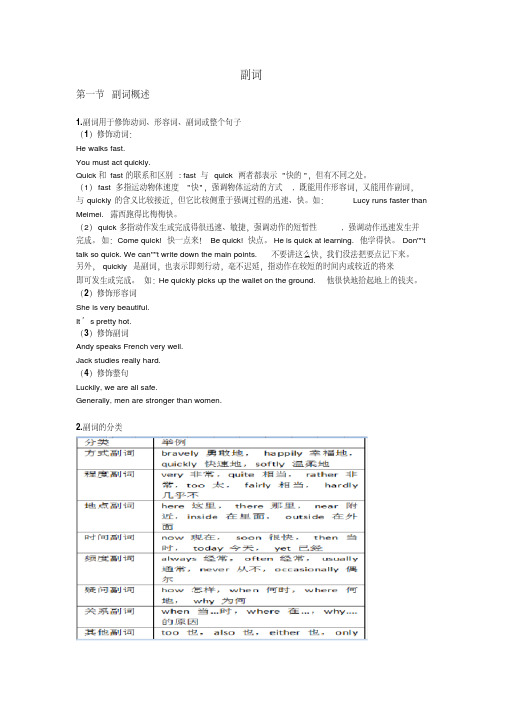
副词第一节副词概述1.副词用于修饰动词、形容词、副词或整个句子(1)修饰动词:He walks fast.You must act quickly.Quick和fast的联系和区别: fast 与quick 两者都表示"快的",但有不同之处。
(1)fast多指运动物体速度"快",强调物体运动的方式, 既能用作形容词,又能用作副词,与quickly的含义比较接近,但它比较侧重于强调过程的迅速、快。
如:Lucy runs faster than Meimei. 露西跑得比梅梅快。
(2)quick多指动作发生或完成得很迅速、敏捷,强调动作的短暂性, 强调动作迅速发生并完成。
如:Come quick! 快一点来!Be quick! 快点。
He is quick at learning. 他学得快。
Don''''t talk so quick. We can''''t write down the main points. 不要讲这么快,我们没法把要点记下来。
另外,quickly是副词,也表示即刻行动,毫不迟延,指动作在较短的时间内或较近的将来即可发生或完成。
如:He quickly picks up the wallet on the ground. 他很快地拾起地上的钱夹。
(2)修饰形容词She is very beautiful.It’s pretty hot.(3)修饰副词Andy speaks French very well.Jack studies really hard.(4)修饰整句Luckily, we are all safe.Generally, men are stronger than women.2.副词的分类第二节副词的构成和比较等级1.形容词构成副词的一般规则有些形容词和副词同形,如:back adj. 后面的back adv. 向后地2.副词的比较等级(1)单音节词,加-er和-est(2)双音节词及多音节词,加more 和most但是early 的比较级和最高级则分别为:earlier earliest (3)不规则变化的词farther/ farthest, further /furthest的用法farther/ farthest和further /furthest都可用于表示距离和时间上的远We can go farther/further.We can look back farther/further into the past to find the truth.further /furthest 还可表示程度上的“深远”“进一步”The police will research further into this matter.3.原级比较常用句型,,as+副词原级+as,.该句型表示:,.和,..一样He speaks as loudly as you do.,.not as (so)+副词原级+as...该句型表示:,..不如,..I can’t walk as/so fast as you.他没有你反应的快。
初中英语副词的知识点归纳

初中英语副词的知识点归纳副词可修饰动词,又可修饰形容词,初中生要好好掌握这一个知识点。
小编为大家准备了副词的知识点总结,一起来看看吧!副词的基本用法副词主要用来修饰动词,形容词,副词或其他结构。
一、副词的位置:1) 在动词之前。
2) 在be动词、助动词之后。
3) 多个助动词时,副词一般放在第一个助动词后。
注意:a. 大多数方式副词位于句尾,但宾语过长,副词可以提前,以使句子平衡。
We could see very clearly a strange light ahead of us.b. 方式副词well,badly糟、坏,hard等只放在句尾。
He speaks English well.二、副词的排列顺序:1) 时间,地点副词,小单位的在前,大单位在后。
2) 方式副词,短的在前,长的在后,并用and或but等连词连接。
Please write slowly and carefully.3) 多个不同副词排列:程度+地点+方式+时间副词。
注意:副词very 可以修饰形容词,但不能修饰动词。
改错:(错) I very like English.(对) I like English very much.注意:副词enough要放在形容词的后面,形容词enough放在名词前后都可。
I don't know him well enough.There is enough food for everyone to eat.There is food enough for everyone to eat.兼有两种形式的副词1) close与closelyclose意思是"近"; closely 意思是"仔细地"He is sitting close to me.Watch him closely.2) late 与latelylate意思是"晚"; lately 意思是"最近"You have come too late.What have you been doing lately?3) deep与deeplydeep意思是"深",表示空间深度;deeply时常表示感情上的深度,"深深地"He pushed the stick deep into the mud.Even father was deeply moved by the film.4) high与highlyhigh表示空间高度;highly表示程度,相当于muchThe plane was flying high.I think highly of your opinion.5) wide与widelywide表示空间宽度;widely意思是"广泛地","在许多地方"He opened the door wide.English is widely used in the world.6) free与freelyfree的意思是"免费";freely 的意思是"无限制地"You can eat free in my restaurant whenever you like.You may speak freely; say what you like.形容词与副词的比较级1) 规则变化单音节词和少数双音节词,加词尾-er,-est来构成比较级和最高级。
七年级英语副词知识点归纳
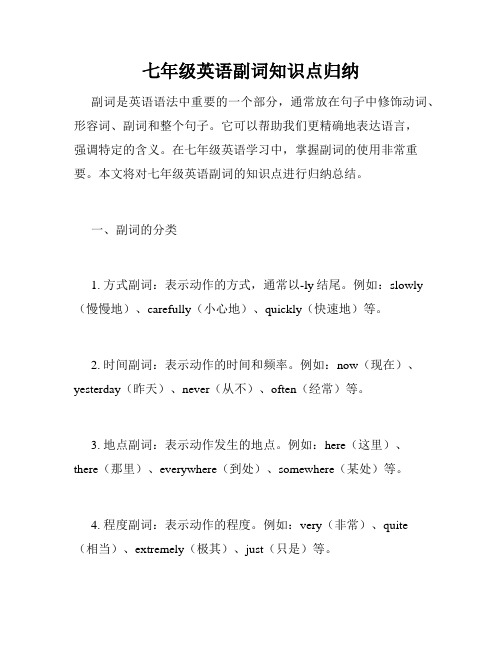
七年级英语副词知识点归纳副词是英语语法中重要的一个部分,通常放在句子中修饰动词、形容词、副词和整个句子。
它可以帮助我们更精确地表达语言,强调特定的含义。
在七年级英语学习中,掌握副词的使用非常重要。
本文将对七年级英语副词的知识点进行归纳总结。
一、副词的分类1. 方式副词:表示动作的方式,通常以-ly结尾。
例如:slowly (慢慢地)、carefully(小心地)、quickly(快速地)等。
2. 时间副词:表示动作的时间和频率。
例如:now(现在)、yesterday(昨天)、never(从不)、often(经常)等。
3. 地点副词:表示动作发生的地点。
例如:here(这里)、there(那里)、everywhere(到处)、somewhere(某处)等。
4. 程度副词:表示动作的程度。
例如:very(非常)、quite(相当)、extremely(极其)、just(只是)等。
二、副词的使用1. 位置:通常放在动词之后,如:She sings well.(她唱得好。
)但是如果修饰整个句子,则放在句首或结尾。
例如:Luckily, I found my keys.(幸运的是,我找到了我的钥匙。
)2. 修饰形容词:例如:He is extremely handsome.(他非常帅气。
)3. 修饰副词:例如:She speaks English very well.(她英语说得非常好。
)4. 修饰整个句子:例如:Fortunately, the weather is good.(幸运的是,天气很好。
)三、副词的比较级和最高级1. 比较级:用于表示两个事物之间的比较。
一般在形容词和副词后面加-er或-more。
例如:She sings more beautifully than her sister.(她唱歌比她妹妹更好听。
)2. 最高级:用于表示三个或三个以上事物之间的比较。
一般在形容词和副词前面加the most或the -est。
(完整版)人教版初中英语各单元副词知识点汇总表
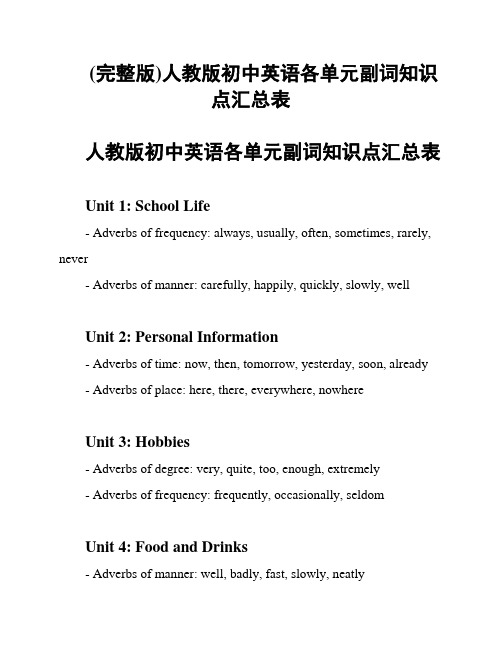
(完整版)人教版初中英语各单元副词知识点汇总表人教版初中英语各单元副词知识点汇总表Unit 1: School Life- Adverbs of frequency: always, usually, often, sometimes, rarely, never- Adverbs of manner: carefully, happily, quickly, slowly, wellUnit 2: Personal Information- Adverbs of time: now, then, tomorrow, yesterday, soon, already - Adverbs of place: here, there, everywhere, nowhereUnit 3: Hobbies- Adverbs of degree: very, quite, too, enough, extremely- Adverbs of frequency: frequently, occasionally, seldomUnit 4: Food and Drinks- Adverbs of manner: well, badly, fast, slowly, neatly- Adverbs of place: at, in, on, up, downUnit 5: Daily Routine- Adverbs of frequency: always, often, sometimes, rarely, never - Adverbs of time: now, then, today, yesterday, soon, alreadyUnit 6: Travel and Transportation- Adverbs of frequency: usually, occasionally, seldom, never - Adverbs of manner: nicely, safely, easilyUnit 7: Festivals and Celebrations- Adverbs of time: soon, then, now, before, after, tonight- Adverbs of place: here, there, somewhere, anywhereUnit 8: Technology- Adverbs of manner: well, carefully, quickly, slowly- Adverbs of frequency: often, occasionally, seldom, neverUnit 9: Jobs and Careers- Adverbs of time: now, then, soon, already, today, tomorrow- Adverbs of degree: very, quite, extremely, enoughUnit 10: Environment- Adverbs of manner: properly, effectively, responsibly- Adverbs of frequency: always, often, sometimes, seldom, neverUnit 11: Health and Fitness- Adverbs of manner: well, badly, fast, slowly, easily- Adverbs of time: now, then, soon, already, yesterdayUnit 12: Emotions- Adverbs of degree: very, extremely, quite, enough- Adverbs of frequency: always, usually, rarely, neverUnit 13: Shopping- Adverbs of manner: well, carefully, quickly, slowly, easily- Adverbs of place: here, there, everywhere, somewhereUnit 14: Nature- Adverbs of time: now, then, yesterday, soon, already- Adverbs of degree: very, quite, extremely, enoughUnit 15: Science and Technology- Adverbs of manner: carefully, quickly, slowly, well- Adverbs of frequency: often, sometimes, rarely, never以上是关于人教版初中英语各单元副词知识点汇总表的内容,希望对你有所帮助!。
(完整版)初中英语副词总结归纳大全
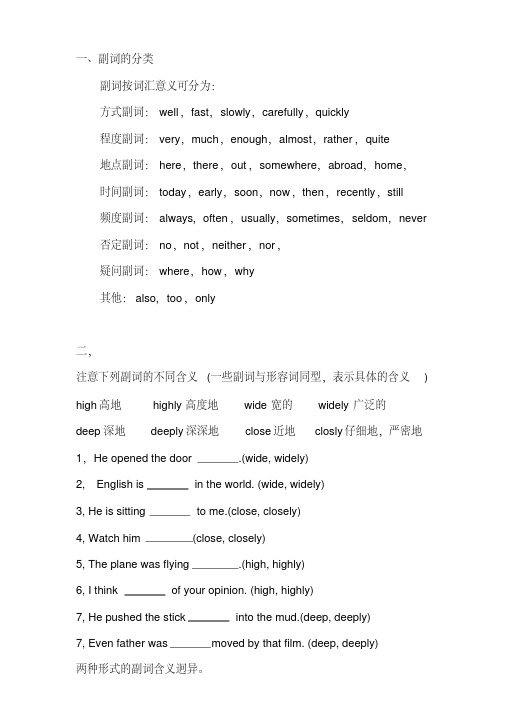
一、副词的分类副词按词汇意义可分为:方式副词:well,fast,slowly,carefully,quickly程度副词:very,much,enough,almost,rather,quite地点副词:here,there,out,somewhere,abroad,home,时间副词:today,early,soon,now,then,recently,still频度副词:always,often,usually,sometimes,seldom,never 否定副词:no,not,neither,nor,疑问副词:where,how,why其他:also,too,only二,注意下列副词的不同含义(一些副词与形容词同型,表示具体的含义) high高地highly高度地wide宽的widely广泛的deep深地deeply深深地close近地closly仔细地,严密地1,He opened the door .(wide, widely)2, English is in the world. (wide, widely)3, He is sitting to me.(close, closely)4, Watch him (close, closely)5, The plane was flying .(high, highly)6, I think of your opinion. (high, highly)7, He pushed the stick into the mud.(deep, deeply)7, Even father was moved by that film. (deep, deeply)两种形式的副词含义迥异。
late迟,晚lately最近hard努力的,艰苦地hardly几乎不just刚刚,仅仅,恰好justly公正地,正当地most很,最mostly主要地almost几乎,差不多三,其它副词比较:1, already与yet的区别already用于肯定句句中,表示“已经”;yet用于否定句句末,表示“还”,用于疑问句句末,表示“已经”例如,He had already left when I called.当我给他打电话时,他已经离开了。
初中英语语法专题--副词精编版
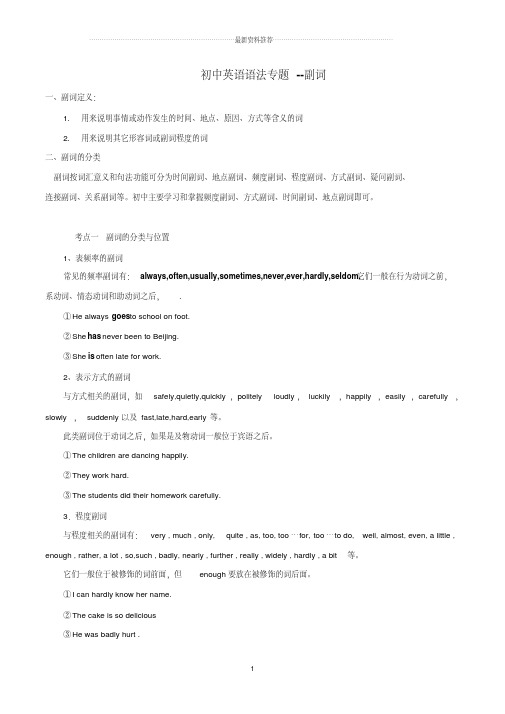
初中英语语法专题--副词一、副词定义:1.用来说明事情或动作发生的时间、地点、原因、方式等含义的词2.用来说明其它形容词或副词程度的词二、副词的分类副词按词汇意义和句法功能可分为时间副词、地点副词、频度副词、程度副词、方式副词、疑问副词、连接副词、关系副词等。
初中主要学习和掌握频度副词、方式副词、时间副词、地点副词即可。
考点一副词的分类与位置1、表频率的副词常见的频率副词有:always,often,usually,sometimes,never,ever,hardly,seldom.它们一般在行为动词之前,系动词、情态动词和助动词之后,.①He always goes t o school on foot.②She has never been to Beijing.③She is often late for work.2、表示方式的副词与方式相关的副词,如safely,quietly,quickly,politely loudly,luckily ,happily ,easily ,carefully ,slowly ,suddenly以及fast,late,hard,early等。
此类副词位于动词之后,如果是及物动词一般位于宾语之后。
①The children are dancing happily.②They work hard.③The students did their homework carefully.3.程度副词与程度相关的副词有:very , much , only, quite , as, too, too…for,too…to do, well, almost, even, a little , enough , rather, a lot , so,such , badly, nearly , further , really , widely , hardly , a bit等。
通辽市初中英语语法知识—副词的全集汇编附解析

一、选择题1.Eddie is very lazy and he ________ exercises.A.sometimes B.never C.often D.always 2.My sister is too young to_______herself_______.A.look at;good B.look like;well C.look after;good D.look after;well 3.Li Hua studies very_______ and her English is_______ in her class.A.hardly; good B.hardly; well C.hard; best D.hard; the best 4.—Sarah always asks “Where’s my mother?”.—After all (毕竟), she is _______ three years old. She needs mother.A.then B.always C.only5.Helen was so excited at the news that she could ________ say a word.A.ever B.almost C.hardly6.Of us all, Kangkang worked .A.hardest B.most hardly C.harder7.My mother usually at 5:30 in the afternoon.A.get home B.get to homeC.gets to home D.gets home8.— Look! It is raining ______.—That’s right. The rain is too ______ to go shopping.A.heavily; heavy B.heavily; heavily C.heavy; heavy D.heavy; heavily 9.―What do you think of the TV show Readers hosted by Dong Qing?―Wonderful! I think it is a meaningful TV show that many people like watching it. A.so; so B.so; such C.such; such D.such; so 10.—Would you like a glass of cola?—Thanks. But I ______ drink cola. I can’t stand its taste.A.usually B.never C.often D.always 11.Tom came to school ________and missed the first lessonA.lately B.later C.late D.latter 12.—Do you often go shopping with your mom, Mike?—You know, most boys ________ go shopping, but I do.A.sometimes B.usually C.hardly13.The old man lives ___________ , but he doesn't feel ________ .A.lonely; alone B.alone; lonely C.alone; alone D.lonely; lonely 14.—How was your trip to the British Museum?—I spoke no English and was _______ silent during the visit.A.completely B.peacefully C.patiently D.carefully 15.Tom gets to school early every day, so he is ___________ late for class.A.never B.sometimes C.usually16.Little Tom draws __________. His pictures are very __________.A.good;well B.good;good C.well;good17.My uncle doesn’t like fast food, so he _____eats it..A.always B.oftenC.sometimes D.seldom18.—Remember, ________ you do your homework, ________ mistakes you will make. —OK, Mom.A.the more careful; the less B.the more carefully; the less C.the more carefully; the fewer19.— Is your home close to the school, Tom?— No, it's a long way, but I am________ late for school because I get up early daily.A.always B.usually C.never D.sometimes 20.John is a kind boy. He __________ helps others when they are in trouble.A.never B.hardly C.always D.sometimes 21.—Don't go out now,look,it is raining outside,we had better stay at home and watch TV.A.big B.strong C.hard D.hardly 22.Generally speaking, over my career , the harder the course is, ______ I play.A.well B.better C.the best D.the better23.I didn’t do very well in this exam. Unlu ckily, he did it .A.badly B.worse C.better D.worst24.My grandfather lives______ in a(an) _______ village but he never feels _________. A.lonely, alone, lonely B.alone, lonely, lonely C.alone, alone, lonely D.lonely, lonely, alone 25.— How often do you eat junk food(垃圾食品)?—________.A.Two weeks B.Never C.In the morning D.This weekend【参考答案】***试卷处理标记,请不要删除一、选择题1.B解析:B【解析】句意:Eddie非常懒,他从不锻炼。
初中副词的知识点总结大全
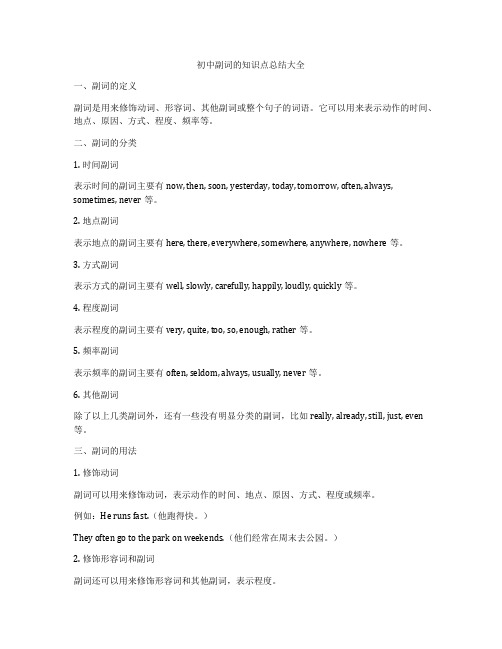
初中副词的知识点总结大全一、副词的定义副词是用来修饰动词、形容词、其他副词或整个句子的词语。
它可以用来表示动作的时间、地点、原因、方式、程度、频率等。
二、副词的分类1. 时间副词表示时间的副词主要有now, then, soon, yesterday, today, tomorrow, often, always, sometimes, never等。
2. 地点副词表示地点的副词主要有here, there, everywhere, somewhere, anywhere, nowhere等。
3. 方式副词表示方式的副词主要有well, slowly, carefully, happily, loudly, quickly等。
4. 程度副词表示程度的副词主要有very, quite, too, so, enough, rather等。
5. 频率副词表示频率的副词主要有often, seldom, always, usually, never等。
6. 其他副词除了以上几类副词外,还有一些没有明显分类的副词,比如really, already, still, just, even 等。
三、副词的用法1. 修饰动词副词可以用来修饰动词,表示动作的时间、地点、原因、方式、程度或频率。
例如:He runs fast.(他跑得快。
)They often go to the park on weekends.(他们经常在周末去公园。
)2. 修饰形容词和副词副词还可以用来修饰形容词和其他副词,表示程度。
例如:She is very beautiful.(她非常漂亮。
)3. 修饰整个句子副词还可以用来修饰整个句子,表示说话人的态度、角度或者整个句子的总体情况。
例如:Hopefully, everything will be fine.(希望一切顺利。
)四、副词的用法注意事项1. 位置副词一般放在被修饰的词语之后,但有时也会放在被修饰的词语之前。
初中英语副词知识点归纳
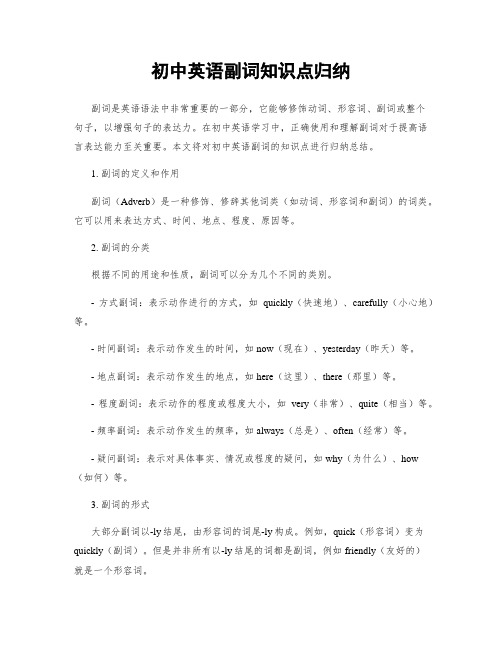
初中英语副词知识点归纳副词是英语语法中非常重要的一部分,它能够修饰动词、形容词、副词或整个句子,以增强句子的表达力。
在初中英语学习中,正确使用和理解副词对于提高语言表达能力至关重要。
本文将对初中英语副词的知识点进行归纳总结。
1. 副词的定义和作用副词(Adverb)是一种修饰、修辞其他词类(如动词、形容词和副词)的词类。
它可以用来表达方式、时间、地点、程度、原因等。
2. 副词的分类根据不同的用途和性质,副词可以分为几个不同的类别。
- 方式副词:表示动作进行的方式,如quickly(快速地)、carefully(小心地)等。
- 时间副词:表示动作发生的时间,如now(现在)、yesterday(昨天)等。
- 地点副词:表示动作发生的地点,如here(这里)、there(那里)等。
- 程度副词:表示动作的程度或程度大小,如very(非常)、quite(相当)等。
- 频率副词:表示动作发生的频率,如always(总是)、often(经常)等。
- 疑问副词:表示对具体事实、情况或程度的疑问,如why(为什么)、how (如何)等。
3. 副词的形式大部分副词以-ly结尾,由形容词的词尾-ly构成。
例如,quick(形容词)变为quickly(副词)。
但是并非所有以-ly结尾的词都是副词,例如friendly(友好的)就是一个形容词。
4. 副词的位置副词通常位于动词之后,形容词之前或者句子的末尾。
具体位置取决于不同的修饰对象和句子结构。
- 修饰动词:She runs quickly.(她跑得快。
)- 修饰形容词:He is very tall.(他很高。
)- 句子的末尾:She studied hard, therefore she passed the exam.(她学习刻苦,因此她通过了考试。
)5. 常见的副词下面列举一些常见的副词及其在句子中的具体用法。
- manner(方式):carefully(仔细地)、slowly(慢慢地)- time(时间):now(现在)、soon(不久)、yesterday(昨天)- place(地点):here(这里)、there(那里)- degree(程度):very(非常)、quite(相当)- frequency(频率):always(总是)、often(经常)- question(疑问):why(为什么)、how(如何)6. 副词与其他词类的不同副词与其他词类(如形容词和名词)在用法和意义上有所不同,需要注意以下几点。
(完整版)副词知识点总结
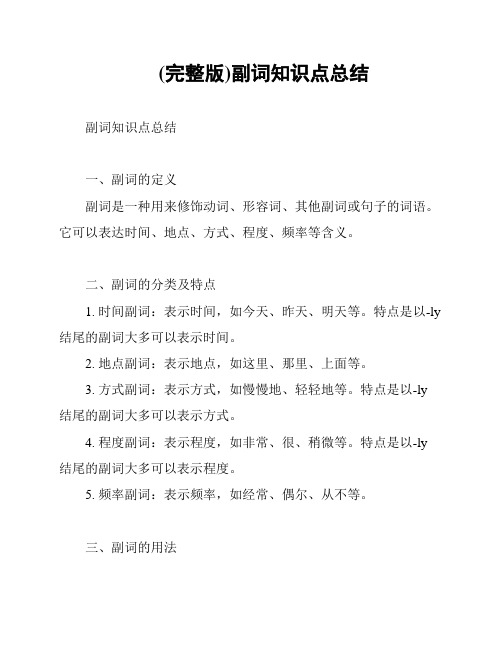
(完整版)副词知识点总结副词知识点总结一、副词的定义副词是一种用来修饰动词、形容词、其他副词或句子的词语。
它可以表达时间、地点、方式、程度、频率等含义。
二、副词的分类及特点1. 时间副词:表示时间,如今天、昨天、明天等。
特点是以-ly 结尾的副词大多可以表示时间。
2. 地点副词:表示地点,如这里、那里、上面等。
3. 方式副词:表示方式,如慢慢地、轻轻地等。
特点是以-ly 结尾的副词大多可以表示方式。
4. 程度副词:表示程度,如非常、很、稍微等。
特点是以-ly 结尾的副词大多可以表示程度。
5. 频率副词:表示频率,如经常、偶尔、从不等。
三、副词的用法1. 修饰动词:副词可以修饰动词,表示动作的方式、程度、频率等。
- 例如:他快速地跑了起来。
2. 修饰形容词或副词:副词可以修饰形容词或副词,表示形容词或副词的程度。
- 例如:她非常漂亮。
3. 修饰句子:副词可以修饰整个句子,表示说话人的态度、观点等。
- 例如:幸运地,我们赶上了最后一班车。
四、常见的副词以下是一些常见的副词及其分类:- 时间副词:今天、明天、昨天、以前、以后等。
- 地点副词:这里、那里、上面、下面等。
- 方式副词:快速地、慢慢地、轻轻地等。
- 程度副词:很、非常、稍微等。
- 频率副词:常常、偶尔、从不等。
五、注意事项1. 部分副词在句子中的位置是固定的,如常放在动词前面、形容词后面。
2. 一些形容词也可以作为副词使用,但在句子中的位置有所不同。
以上是有关副词的知识点总结,希望对您的研究有所帮助!。
新初中英语语法知识—副词的单元汇编含解析
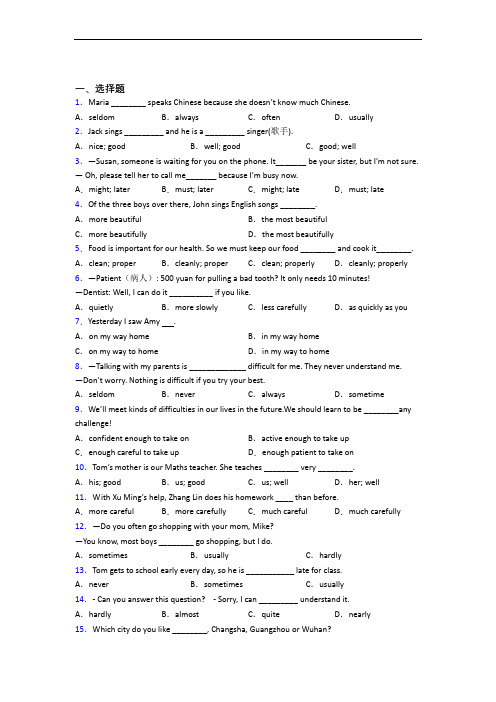
一、选择题1.Maria ________ speaks Chinese because she doesn’t know much Chinese.A.seldom B.always C.often D.usually2.Jack sings _________ and he is a _________ singer(歌手).A.nice; good B.well; good C.good; well 3.—Susan, someone is waiting for you on the p hone. It_______ be your sister, but I’m not sure.—Oh, please tell her to call me_______ because I’m busy now.A.might; later B.must; later C.might; late D.must; late4.Of the three boys over there, John sings English songs ________.A.more beautiful B.the most beautifulC.more beautifully D.the most beautifully5.Food is important for our health. So we must keep our food ________ and cook it________. A.clean; proper B.cleanly; proper C.clean; properly D.cleanly; properly 6.—Patient(病人): 500 yuan for pulling a bad tooth? It only needs 10 minutes!—Dentist: Well, I can do it __________ if you like.A.quietly B.more slowly C.less carefully D.as quickly as you 7.Yesterday I saw Amy .A.on my way home B.in my way homeC.on my way to home D.in my way to home8.—Talking with my parents is _____________ difficult for me. They never understand me.—Don’t worry. Nothing is difficult if you try your best.A.seldom B.never C.always D.sometime 9.We’ll meet kinds of difficulties in our lives in the future.We should learn to be ________any challenge!A.confident enough to take on B.active enough to take upC.enough careful to take up D.enough patient to take on10.Tom’s mother is our Maths teacher. She teaches ________ very ________.A.his; good B.us; good C.us; well D.her; well 11.With Xu Ming’s help, Zhang Lin does his homework ____ than before.A.more careful B.more carefully C.much careful D.much carefully 12.—Do you often go shopping with your mom, Mike?—You know, most boys ________ go shopping, but I do.A.sometimes B.usually C.hardly13.Tom gets to school early every day, so he is ___________ late for class.A.never B.sometimes C.usually14.- Can you answer this question? - Sorry, I can _________ understand it.A.hardly B.almost C.quite D.nearly 15.Which city do you like ________, Changsha, Guangzhou or Wuhan?A.best B.better C.more16.Practice makes perfect. You learn to play the piano by practicing. _______, you can’t really learn a language well without using it.A.Probably B.Hopefully C.Thankfully D.Similarly 17.—How often do you write to your cousin in Francisco?—________. I’m busy preparing for my exams these days.A.Seldom B.Often C.Always18.John is a kind boy. He __________ helps others when they are in trouble.A.never B.hardly C.always D.sometimes 19.Mr. Green is very strict with his children, and he ______ allows them to watch TV on school days.A.always B.usually C.sometimes D.never 20.We’re happy that our country has developed ______ these years than before. A.quickly B.less quickly C.more quickly D.most quickly 21.I didn’t do very well in this exam. Unluckily, he did it .A.badly B.worse C.better D.worst22.--What do you think of the football match?--Wonderful! The Chinese football team has never played __________.A.worse B.worst C.better D.best23.The children are making too much __________. How __________ they are playing! A.noise; noisily B.noise; noisy C.noisy; noisy D.noisy; noisily 24.These days lots of people are working_________ to get_________ for their living. A.hard enough; enough money B.enough hardly; money enough C.enough hard; money enough D.hardly enough; enough money25.Han Han’s books are_______ written and sell______.A.good ; good B.good ; well C.well; well D.well ; good【参考答案】***试卷处理标记,请不要删除一、选择题1.A解析:A【解析】【分析】【详解】句意:Maria很少说汉语,因为她不太懂中文。
中考英语副词知识点总结
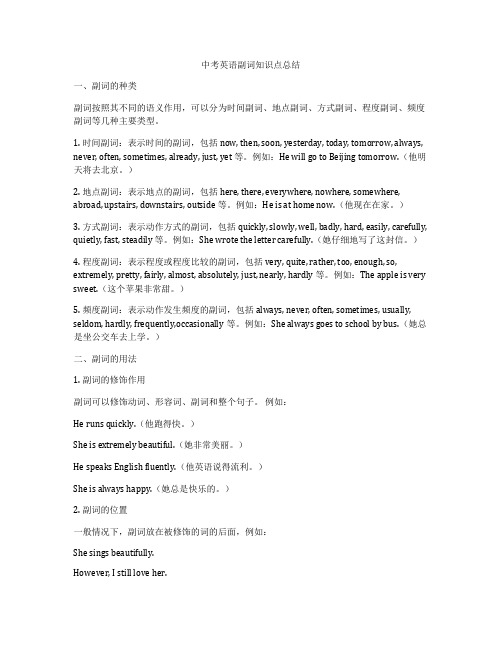
中考英语副词知识点总结一、副词的种类副词按照其不同的语义作用,可以分为时间副词、地点副词、方式副词、程度副词、频度副词等几种主要类型。
1. 时间副词:表示时间的副词,包括now, then, soon, yesterday, today, tomorrow, always, never, often, sometimes, already, just, yet 等。
例如:He will go to Beijing tomorrow.(他明天将去北京。
)2. 地点副词:表示地点的副词,包括here, there, everywhere, nowhere, somewhere, abroad, upstairs, downstairs, outside 等。
例如:He is at home now.(他现在在家。
)3. 方式副词:表示动作方式的副词,包括quickly, slowly, well, badly, hard, easily, carefully, quietly, fast, steadily 等。
例如:She wrote the letter carefully.(她仔细地写了这封信。
)4. 程度副词:表示程度或程度比较的副词,包括very, quite, rather, too, enough, so, extremely, pretty, fairly, almost, absolutely, just, nearly, hardly 等。
例如:The apple is very sweet.(这个苹果非常甜。
)5. 频度副词:表示动作发生频度的副词,包括always, never, often, sometimes, usually, seldom, hardly, frequently,occasionally等。
例如:She always goes to school by bus.(她总是坐公交车去上学。
副词知识点总结

副词知识点总结一、副词的分类1. 根据含义的不同,副词可以分为以下几类:程度副词、时间副词、地点副词、方式副词和疑问副词。
2. 程度副词:表示动词或形容词的程度或强度,比如 very, quite, too, enough, almost 等。
3. 时间副词:表示动作或状态的时间,比如 now, then, soon, yesterday, today, tomorrow 等。
4. 地点副词:表示动作发生的地点或者方向,比如 here, there, everywhere, somewhere, in, out, near, far 等。
5. 方式副词:表示动作进行的方式,比如 well, fast, slowly, carefully 等。
6. 疑问副词:用来引导疑问句,比如 where, when, why, how 等。
二、副词的用法1. 修饰动词:用副词来修饰动词,可以表示动作的方式、程度或者时间等,比如 He runs quickly.(他跑得很快。
)2. 修饰形容词:用副词来修饰形容词,可以表示程度或者强调,比如 It's very cold.(天气很冷。
)3. 修饰其他副词:有些副词可以修饰其他副词,比如 very slowly(非常缓慢)、quite well(相当好)等。
4. 修饰全句:一些副词可以用来修饰整个句子,比如 Unfortunately, we missed the bus.(不幸的是,我们错过了公共汽车。
)5. 修饰介词短语:一些副词可以用来修饰介词短语,比如 He walked around the park.(他在公园里徘徊了一圈。
)三、副词的比较级和最高级1. 大多数副词比较级是在其原形后面加上-er,最高级在其原形后面加上-est,比如 quickly (快),比较级是 quicker(更快),最高级是 quickest(最快)。
2. 一些副词的比较级和最高级需要在前面加上 more 和 most,比如 carefully(小心地),比较级是 more carefully(更小心地),最高级是 most carefully(最小心地)。
《中考英语》初中英语语法知识—副词的知识点总复习附解析
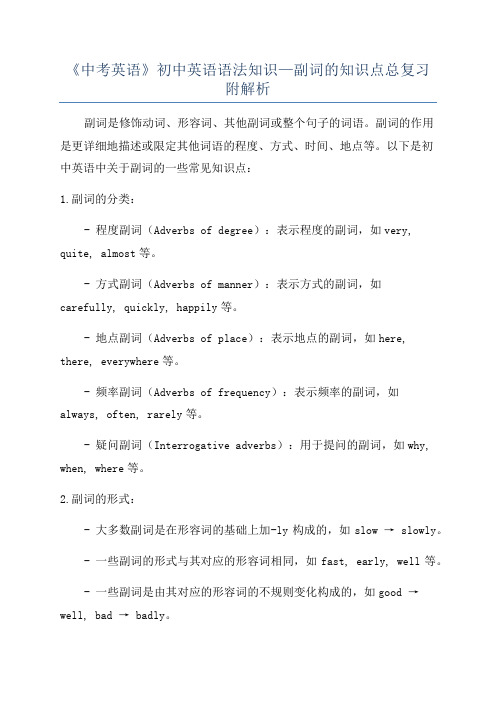
《中考英语》初中英语语法知识—副词的知识点总复习附解析副词是修饰动词、形容词、其他副词或整个句子的词语。
副词的作用是更详细地描述或限定其他词语的程度、方式、时间、地点等。
以下是初中英语中关于副词的一些常见知识点:1.副词的分类:- 程度副词(Adverbs of degree):表示程度的副词,如very, quite, almost等。
- 方式副词(Adverbs of manner):表示方式的副词,如carefully, quickly, happily等。
- 地点副词(Adverbs of place):表示地点的副词,如here, there, everywhere等。
- 频率副词(Adverbs of frequency):表示频率的副词,如always, often, rarely等。
- 疑问副词(Interrogative adverbs):用于提问的副词,如why, when, where等。
2.副词的形式:- 大多数副词是在形容词的基础上加-ly构成的,如slow → slowly。
- 一些副词的形式与其对应的形容词相同,如fast, early, well等。
- 一些副词是由其对应的形容词的不规则变化构成的,如good → well, bad → badly。
3.副词的位置:- 一般情况下,副词位于动词或形容词之后,如He runs quickly.- 当句子中有助动词时,副词位于助动词之后,如He can easily solve the problem.- 当句子中既有助动词又有情态动词时,副词位于情态动词之后,如He will definitely pass the test.解析:1.副词的分类可以帮助我们更好地理解副词的不同用法和含义。
2. 注意一些特殊的副词形式,特别是那些不是通过在形容词后加-ly 构成的副词。
3.熟悉副词的常见位置,以免在句子中使用错误。
4. 注意副词的用法,例如在修饰比较级或最高级形容词时的特殊用法,如more quickly, most easily.。
新初中英语语法知识—副词的分类汇编含答案
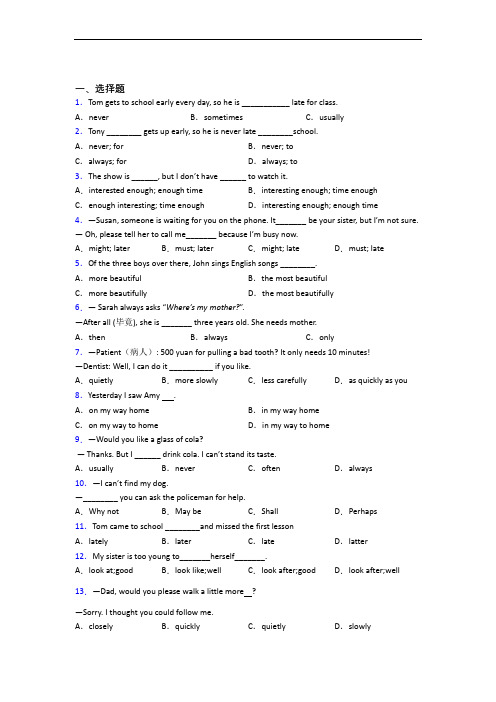
一、选择题1.Tom gets to school early every day, so he is ___________ late for class.A.never B.sometimes C.usually2.Tony ________ gets up early, so he is never late ________school.A.never; for B.never; toC.always; for D.always; to3.The show is ______, bu t I don’t have ______ to watch it.A.interested enough; enough time B.interesting enough; time enough C.enough interesting; time enough D.interesting enough; enough time 4.—Susan, someone is waiting for you on the phone. It_______ be your sister, but I’m n ot sure.—Oh, please tell her to call me_______ because I’m busy now.A.might; later B.must; later C.might; late D.must; late5.Of the three boys over there, John sings English songs ________.A.more beautiful B.the most beautifulC.more beautifully D.the most beautifully6.—Sarah always asks “Where’s my mother?”.—After all (毕竟), she is _______ three years old. She needs mother.A.then B.always C.only7.—Patient(病人): 500 yuan for pulling a bad tooth? It only needs 10 minutes!—Dentist: Well, I can do it __________ if you like.A.quietly B.more slowly C.less carefully D.as quickly as you 8.Yesterday I saw Amy .A.on my way home B.in my way homeC.on my way to home D.in my way to home9.—Would you like a glass of cola?— Thanks. But I ______ drink co la. I can’t stand its taste.A.usually B.never C.often D.always10.—I can’t find my dog.—________ you can ask the policeman for help.A.Why not B.May be C.Shall D.Perhaps 11.Tom came to school ________and missed the first lessonA.lately B.later C.late D.latter12.My sister is too young to_______herself_______.A.look at;good B.look like;well C.look after;good D.look after;well 13.—Dad, would you please walk a little more ?—Sorry. I thought you could follow me.A.closely B.quickly C.quietly D.slowly14.- Can you answer this question? - Sorry, I can _________ understand it.A.hardly B.almost C.quite D.nearly15.The poor woman lives _________.But she never feels ________.A.alone; lonely B.lonely; lonely C.alone; alone D.lonely; alone 16.— Is your home close to the school, Tom?— No, it's a long way, but I am________ late for school because I get up early daily. A.always B.usually C.never D.sometimes 17.Practice makes perfect. You learn to play the piano by practicing. _______, you can’t really learn a language well without using it.A.Probably B.Hopefully C.Thankfully D.Similarly18.Li Ming failed the final exam, so he decided to study _______ next term.A.hardly B.hard C.harder D.hardest 19.We’re happy that our country has developed ______ these years than before. A.quickly B.less quickly C.more quickly D.most quickly 20.—Why do you think Sam did _______ than anyone else in the competition?—Because he sang most loudly and _______.A.worse; carefully B.better; clearlyC.worse; quietly D.best; carefully21.I didn’t do very well in this exam. Unluckily, he did it .A.badly B.worse C.better D.worst22.--What do you think of the football match?--Wonderful! The Chinese football team has never played __________.A.worse B.worst C.better D.best23.The children are making too much __________. How __________ they are playing! A.noise; noisily B.noise; noisy C.noisy; noisy D.noisy; noisily 24.—As we know, it’s difficult to live in the foreign country.—______ if you don’t understand the local language.A.Generally B.Naturally C.Exactly D.Especially 25.With Xu Ming’s help, Zhang Lin does his homework ____ than before.A.more careful B.more carefully C.much careful D.much carefully 【参考答案】***试卷处理标记,请不要删除一、选择题1.A解析:A【解析】【分析】【详解】句意:汤姆每天上学很早,所以上课从不迟到。
- 1、下载文档前请自行甄别文档内容的完整性,平台不提供额外的编辑、内容补充、找答案等附加服务。
- 2、"仅部分预览"的文档,不可在线预览部分如存在完整性等问题,可反馈申请退款(可完整预览的文档不适用该条件!)。
- 3、如文档侵犯您的权益,请联系客服反馈,我们会尽快为您处理(人工客服工作时间:9:00-18:30)。
一、选择题1.The meeting room isn’t _______ for all the students to sit _______.A.enough big, / B.big enough, /C.large enough, in D.enough large, by2.The show is ______, but I don’t have ______ to watch it.A.interested enough; enough time B.interesting enough; time enough C.enough interesting; time enough D.interesting enough; enough time 3.—Does Mary________come to see you?—Yeah! She comes to see me every weekend.A.never B.oftenC.soon D.only4.—Susan, someone is waiting for you on the phone. It_______ be your sister, but I’m not sure.—Oh, please tell her to call me_______ because I’m busy now.A.might; later B.must; later C.might; late D.must; late5.Li Hua studies very_______ and her English is_______ in her class.A.hardly; good B.hardly; well C.hard; best D.hard; the best 6.________of the people here live on rice, and the people there live________on wheat. A.Mostly; mostly B.Most; mostly C.Mostly; most D.Most; most7.Of the three boys over there, John sings English songs ________.A.more beautiful B.the most beautifulC.more beautifully D.the most beautifully8.—Sarah always asks “Where’s my mother?”.—After all (毕竟), she is _______ three years old. She needs mother.A.then B.always C.only9.Food is important for our health. So we must keep our food ________ and cook it________. A.clean; proper B.cleanly; proper C.clean; properly D.cleanly; properly 10.—Every student likes Ms. Wang very much.—Yes. She________makes her lessons interesting.A.never B.always C.Sometime 11.—Mom,let's have a rest.I can't walk on.—You get tired __________.You need more exercise.A.easily B.slowly C.freely D.quietly12.My mother ________ at five o’clock.A.usually gets B.usually gets upC.gets up usually D.get usually up13.—Would you like a glass of cola?— Thanks. But I ______ drink cola. I can’t stand its taste.A.usually B.never C.often D.always14.—How was your trip to the British Museum?—I spoke no English and was _______ silent during the visit.A.completely B.peacefully C.patiently D.carefully 15.Millie is good at singing .She sings________the famous singer CoCo.A.as good as B.as the best as C.as well as D.as better as 16.As we know, we should eat ________because a________ diet is good for our health. A.regular; regular B.regular; regularly C.regularly; regular 17.—Paul is very fat.—Yes, he________plays sports and he eats too much.A.always B.never C.usually18.—Jack, how was your summer vacation?—Just so-so. I decided to go for my next vacation.A.something wonderful B.wonderful somethingC.somewhere wonderful D.wonderful somewhere19.—Don't go out now,look,it is raining outside,we had better stay at home and watch TV.A.big B.strong C.hard D.hardly20.Li Ming failed the final exam, so he decided to study _______ next term.A.hardly B.hard C.harder D.hardest21.— He studies late every day and goes to bed before twelve o’clock.—That’s bad for his health.A.always B.just C.already D.hardly22.The children are making too much __________. How __________ they are playing! A.noise; noisily B.noise; noisy C.noisy; noisy D.noisy; noisily 23.My grandfather lives______ in a(an) _______ village but he never feels _________. A.lonely, alone, lonely B.alone, lonely, lonely C.alone, alone, lonely D.lonely, lonely, alone 24.- Can you answer this question? - Sorry, I can _________ understand it.A.hardly B.almost C.quite D.nearly 25.—Talking with my parents is _____________ difficult for me. They never understand me.—Don’t worry. Nothing is difficult if you try your best.A.seldom B.never C.always D.sometime【参考答案】***试卷处理标记,请不要删除一、选择题1.C解析:C【解析】试题分析:句意:会议室不够大,容不下所有的学生都坐在里面。
enough修饰形容词或副词,要放在所修饰的形容词或副词的后面。
排除A,D;sit in the meeting room,in不可省略。
故答案为C。
考点:考查副词enough的用法。
2.D解析:D【解析】【详解】句意:这个节目很有趣,但是我没有足够的时间去观看。
考查形容词辨析以及enough修饰形容词和名词的用法。
interested enough足够感兴趣;enough time足够的时间;interesting enough足够有趣。
根据句中show“演出,表演”,表示“物”,所以此处使用形容词interesting表示“演出是有趣的”;enough修饰形容词时,放在形容词之后,修饰名词时,放在名词之前,所以第一空使用interesting enough,第二空使用enough time。
故选D。
3.B解析:B【解析】【详解】句意:——Mary经常来看你吗?——是的!她每个周末都来看我。
考查频度副词。
never从不;often经常;soon不久、很快;only仅仅。
根据答语She comes to see me every weekend. 她每个周末都来看我。
可知上文应是问“Mary经常来看你吗?”故答案选B。
4.A解析:A【解析】【详解】句意:——苏珊,有人在电话里等你。
可能是你妹妹,但我不确定。
——哦,我现在很忙,请告诉她晚点给我打电话。
考查情态动词辨析及副词。
might可能;must一定;later以后;late晚的,根据第一个空后面的but I’m not sure可知,应该是可能,排除B和D,由第二个空前面的call me可知,应该用later,later则可以作为late的比较级形式,做时间副词表示“随后,稍后”,排除C,故选A。
5.D解析:D【解析】【详解】句意:李华学习很努力,她的英语在班上是最好的。
考查形容词和副词的用法。
Hardly副词,几乎不;hard当副词时,意为“努力地”,当形容词时,意为“坚硬的”;good好的,形容词;well好地,副词;the best最好的,形容词最高级,根据第一个空前面的studies可知,应该填的是副词且意为“努力地”,排除A和B,由后面的in her class可知,应该用形容词最高级,最高级前要加定冠词the,排除C,故选D。
